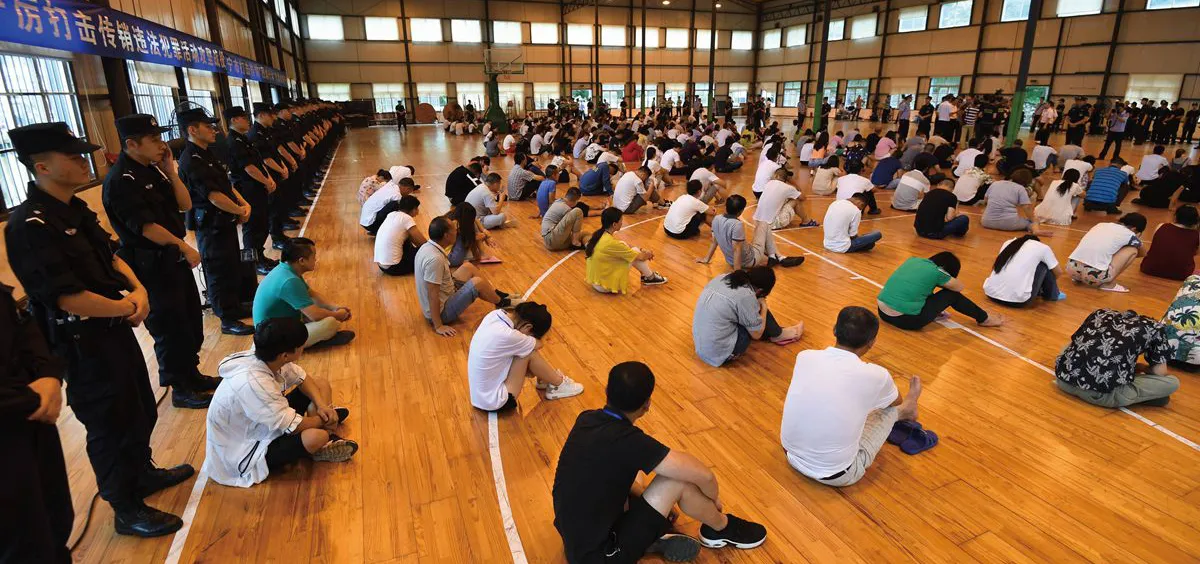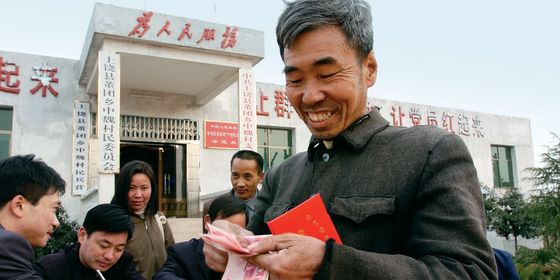“Business cults” pose multi-level challenges to authorities, and heartache for families
When Chuan Yuanchao visited a Zhejiang factory in 2011, he was hoping to get hired as a quality controller. Instead, he ended up being kidnapped, beaten, and forced to sell cosmetics.
Chuan had fallen victim to one of China’s swelling number of violent pyramid schemes (chuanxiao, 传销), characterized by their cult-like recruitment tactics and thuggish enforcement methods. They have been linked to numerous deaths—including three college-educated recruits, whose grisly murders sparked a three-month crackdown in 2017—as well as counter-protests by members angered by the government response.
As defined under 2005’s Regulation of Direct Sales and Regulation on Prohibition of Pyramid Selling, chuanxiao are organizations that illegally make revenue from “joining fees” and donations from members, rather than the sale of an actual product. Sometimes translated as “business cults,” chuanxiao use a combination of persuasion and coercion to control recruits, and incentivized them to enlist new members—a practice known as multi-level marketing (MLM).
Pyramid schemes are found in every capitalist society, but Chinese chuanxiao are able to take particular advantage of an opaque legal system and traditional networks of kinship and trust, hiding amid a plethora of legitimate investment opportunities in China’s fast-changing and technology-driven financial sector.
Practically anyone with ambition can be a potential mark: Desperate graduates seeking jobs, vulnerable migrant workers wishing to invest their meager savings, discontented middle class wanting to get rich, and countless others hoping to cash in on any financial opportunity, however perilous, amid a slowing economy.
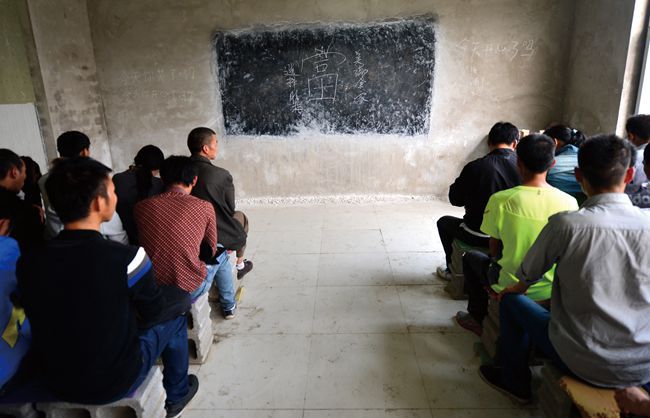
The character for “wealth” is written on the blackboard of one chuanxiao meeting in Beijing
Beijing’s Ma Shengling tells TWOC that she was hoodwinked by a friend who invited her to Shandong province to learn about a business venture. On arrival she was taken to an apartment crammed with pallet beds, where hospitable “housemates” took her luggage and mobile phone for “safekeeping.”
The next day, Ma was taken to a converted garage, where a speaker touted an opportunity to earn a remarkable 238,000 RMB a month with just one 2,900 RMB initial payment. “If you looked disbelieving, or distracted, [the speaker] would suddenly pause and say, ‘Sister, don’t you want to listen? Don’t you want to get rich for your family?’” she recalled. “And if you still insist on leaving, they’d point you the door, and you’d see six men guarding it.”
That afternoon, when her guard was sleeping, Ma managed to run away, hailing a motor-taxi with the gang in hot pursuit. In 2009, she founded the Anti-Pyramid Rescue Center (APRC), an NGO raising awareness of the dangers of chuanxiao staffed entirely by former recruits. Chuan later joined the APRC because, he tells TWOC, “90 percent of those who know nothing about chuanxiao will be brainwashed.”
This is partly because, with their mixture of charisma and coercion, chuanxiao recruiters can appear quite legitimate at first glance. It’s not unusual for Chinese companies, such as real-estate agencies and restaurants chains, to hold rallies and shout slogans to build team unity, just like the stereotypical business cult. It’s also common for blue-collar employers to provide food and accommodation for workers.
It’s also hard to distinguish chuanxiao from legal zhixiao (直销, “direct-selling”) companies. The State Council keeps a list of 91 current organizations, including multinational firms like Amway and Avon, that are granted this status under strict injunctions not to collect joining fees or make false promises (though NGOs say there’s no real difference between chuanxiao and zhixiao’s business models).
Furthermore, many pyramid schemes can be found in plain sight on job-hunting platforms. In 2017, college graduate Li Wenxing drowned in a pond two months after he took a job via Zhipin.com at a Tianjin-based technology company, which turned out to be an MLM front.
Chuan found his fraudulent factory through another job posting, on Ganji.com. He filled out an application form at the company’s office, and it was only after being shown to the workers’ dormitory that things took an alarming turn. “I was surrounded by a dozen people, who gripped my hair and arms and pinned me to the ground,” he recalled in a recent interview at the APRC’s Daxing district headquarters. “They took everything from me: My ID, cell phone, wallet, bank card, even pieces of tissue.”
What followed were 70 days of interrogations and physical assaults, interspersed with lectures, as the cult tried to break down Chuan’s resistance. “Different people came in to brainwash me every day,” Chuan recalls, “asking me to buy cosmetics and telling me how good the prospects would be.” Inductees were expected to hand over their bank card PINs, and buy multiple “cosmetic sets” at 2,800 RMB apiece to sell, though Chuan never saw any evidence that these items even existed.
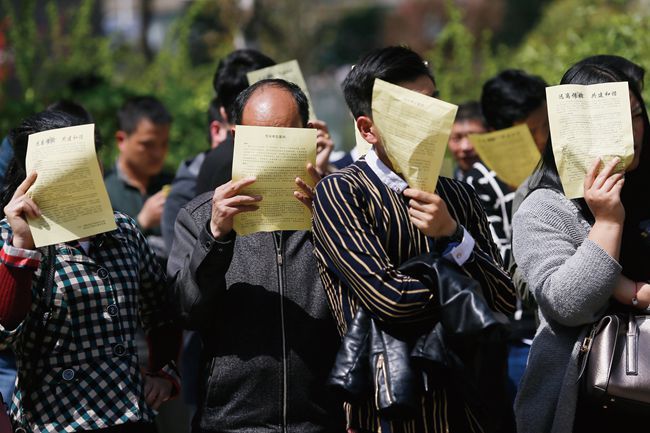
Members of a business cult shield their faces from photographers
There may be as many as 50 million people currently ensnared by chuanxiao, according to the China Anti-Pyramid Promotional Association, another Beijing-based NGO founded by ex-chuanxiao victim Li Xu. Authorities are overwhelmed: In 2016, police opened cases against 3,000 suspected schemes, including Ezubao, a government-backed peer-to-peer lending company that bilked 900,000 investors out of nearly 50 billion RMB; that number doubled in 2017, which saw three times the annual caseload as the previous decade.
In 2019 alone, as part of another campaign by the State Administration for Market Regulation, authorities opened cases against three major herbal medicine companies: The vast Tianjin-based Quanjian Group, Hualin Group in Hebei, and Infinitus in Shaanxi. All stand accused of using aggressive, pyramid-style methods and false advertising to sell their products to the public; Infinitus is also under investigation for health issues arising from the use of its supplements.
While high-profile, these prosecutions are isolated examples of often haphazard enforcement. Ma recounts an incident in which a citizen—the mother of a police officer—infiltrated a Henan gang and obtained a dossier of the members’ names and ID numbers, only to have cops ignore the evidence.
Ma’s own organization used similar tactics to expose eight further schemes in Ningxia, but police simply used her evidence to extort “fines” from senior scammers. Some local police “may even have a personal connection with pyramid groups, and warn them about upcoming crackdowns,” Ma alleges. Other officers, lacking awareness about chuanxiao, drop rescued victims off at the train station, after which the brainwashed rescuee simply returns to the organization.
Experts say that it is these legal vagaries, along with the highly incentivized nature of China’s financial services, that enable pyramid schemes to operate so successfully. Most will appear indistinguishable from the multiple wealth-management products and “shadow banking” schemes that proliferate on finance platforms, forums, and social media chat groups. The latter are particularly vulnerable to abuse, as their members are usually considered to have been vetted by others—most chuanxiao depend on this good faith, creating a fervent belief that the companies are acting in members’ best interests.
Schemes also exploit the traditional close-knit nature of Chinese families and their favor-swapping business networks, drawing in an ever-expanding pool of eager recruits with a collective interest in keeping the golden goose alive (Chuan witnessed one Hubei man agree to “swindle his family for money” after just nine days). Victims may end up losing their savings, the trust of friends and family, and even their health or their lives.
Followers often react angrily toward anyone who exposes the scam. As one popular sales slogan goes, “Those who aren’t involved have no say.” In December 2018, a court sentenced 10 senior executives from Shanxinhui, a 100-billion RMB (20 billion USD) marketing platform, to several years in prison after its leader used social media to rally 600 supporters to Beijing after the government opened an investigation into the company, bearing banners declaring “Shanxinhui supports the Party’s leadership.”
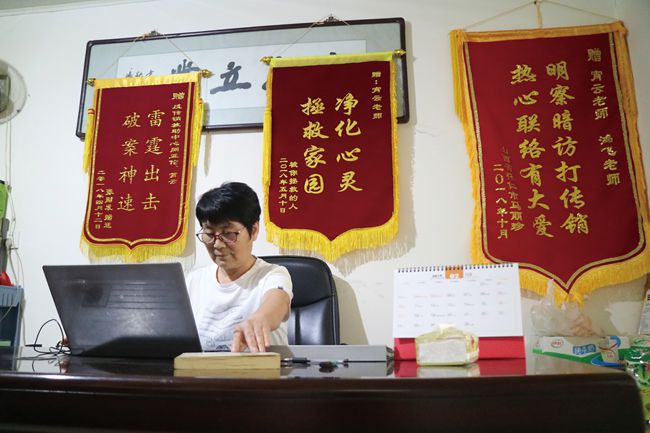
Ma Shengling updates the APRC’s website with warnings about chuanxiao
Prosecutors argued that Shanxinhui, whose name means “Kind Heart Collection,” was an illegal operation that took advantage of gullible investors by offering extraordinary returns of 30 percent or more, and targeted neighborhoods with high poverty and low education levels. Promised riches by a “charitable organization” that effectively controlled every aspect of their daily lives, many of Shanxinhui’s followers refused to believe they were victims.
It wasn’t until Li Xu established his NGO in 2009 that victims’ families had any organized support group to turn to. Ma had been one of the co-founders, before leaving to start the APRC. Today, her organization’s 13 operatives help track, capture, and de-program business cultists, usually at the behest of their families, claiming to treat around 1,000 victims per year with a 95 percent success rate.
These interventions can be arduous, often involving traveling to remote locations, gaining the victim’s trust (usually by posing as a friend of the family, with no anti-chuanxiao connections), and hours of persuasion in which operatives use logic to poke holes in the pyramid scheme’s promises. Even after successful rescues, members may require weeks or months of counseling to deal with PTSD-like symptoms and reintegrate into society.
Unsuccessful interventions have ended with objects thrown at Ma’s team, and one brainwashed father disowning his son for hiring them. Once, Chuan and an elderly couple were chased by 20 stick-wielding men while looking for the couple’s son in Fujian.
The grassroots anti-chuanxiao movement, though, is itself a target of controversy. “Since [anti-pyramid groups] aren’t officially registered [as NGOs],” Beijing lawyer Zhang Wancheng explained to China Youth Daily, their activities “have no legal basis.” This lack of clear regulations makes anti-pyramid groups vulnerable to some of the same accusations as pyramid schemes themselves, including illegal detention (during de-programming sessions) and arbitrary fees.
In 2015, the rescue of college graduate Li Nan from a Tianjin-based scheme was criticized for the methods used by his rescuers, the Jing-Jin-Ji Anti-Pyramid Association. Li’s friends paid 16,000 RMB for the association’s services, which included cell-phone triangulation illicitly obtained from mobile communications providers, blurring the line between the criminals and vigilantes.
Addressing these concerns, Li Xu argued that his team are merely “firefighters” assisting law-enforcement, repeatedly calling for “national regulations and standards” to put his work on a firmer legal footing (Li was unavailable for an interview with TWOC). He agrees that organizations like his “shouldn’t [need to] exist,” telling the Beijing News in 2015 that “they emerged completely out of the pyramid industry…which only exists because of regulatory and legal loopholes.”
Unable to raise money as registered charities, grassroots NGOs rely on “rescue fees” to survive, usually around 4,000 – 5,000 RMB per case. Ma states that the APRC waives the fee for families who cannot pay. The money goes to pay her team’s expenses as well as guarantee their safety—back before the APRC made clients cover their traveling expenses, she says, some cultists would lure their operatives with fake calls for help, and beat them up.
Ultimately, corruption is only a symptom, rather than one of the root issues that neither authorities nor the NGOs seem able to eradicate in their never-ending fight against pyramid schemes. Despite repeated crackdowns and propaganda campaigns about their dangers, MLM companies are adept at exploiting the fear of losing out that haunts many Chinese in the market economy.
Zheng Zichen, an economist at the state-run Guangdong Academy of Social Sciences, has blamed “deep-rooted problems” such as China’s “wealth gap and unbalanced development between urban areas and hinterland provinces.” Ma offers a more cynical view—human nature, which transcends experience and education: “The common sense of officials and professors is equal to kindergarteners’ at the lure of money.”
In the meantime, those like Chuan continue to help victims “leave their unhappy memories behind.” Like other ex-chuanxiao activists, Chuan still remembers the cults’ brutal tactics—kept under constant guard, “even to go to the toilet,” and witnessing “disobedient people beaten with everything [the gang] can get hold of.” He says he was lucky: Eventually deemed “useless” for resisting the organization’s brainwashing, he was blindfolded, put in a car, and dropped off outside of town.
Others are not as fortunate, such as “a girl [who] swallowed a toothbrush head in the bathroom [so that] she got sent to the hospital, and asked for the doctor’s help,” CDhuan recalls. There was a 30-year-old member from Guangzhou whom Ma watched have his ribs broken, and a 24-year-old from Zhejiang who died falling from a window, all while trying to escape.
To Chuan, this human angle makes his work necessary to society, despite its arguably limited impact. “The majority of people we’ve saved from pyramid schemes are young, such as college graduates and veterans. Our work could save them from an illegal business and set them on the right course,” he says, cutting his reminisces short to get ready for another all-night drive. An SOS call had come from a family in Henan.
Additional reporting by Tan Yunfei (谭云飞)
Inverting the Pyramid is a story from our issue, “Wild Rides.” To read the entire issue, become a subscriber and receive the full magazine. Alternatively, you can purchase the digital version from the App Store.







